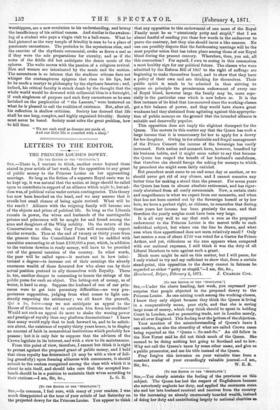LETTERS TO THE EDITOR.
" THE PRINCESS LOUISE'S DOWRY.
[TO THE EDITOR OF THE "SPECTATOR."] SIR.—There is, I venture to think, another cause beyond those stated in your article of last week, for the opposition to any grant of public money to the Princess Louise on her approaching marriage. So long as the fiction of a separate Royal caste was to be kept up, it was natural that the nation at large should be called upon to contribute in support of an alliance which might be, but sel- dom was, of political value under certain contingencies. This theory has now been knocked on the head, and we may assume that it stands but small chance of being again revived. What will be the result ? Alliance with the reigning family will become one of the objects and prizes of political life. So long as the Liberals remain in power, the wives and husbands of the marriageable princes and princesses will be sought for and found among the sons and daughters of the Whig nobility. On the retarn of the Conservatives to office, the Tory Peers will reasonably expect aimi ar rewards. Thus at the end of twenty or thirty years from the present time the Consolidated Fund will be saddled with annuities amounting to at least £100,000 a year, which, in addition to the various dowries in ready money, will have to be provided out of the general taxation of the country. In other words, the poor will be called upon—it matters not in how infini- tesimal a degree—to increase out of their earnings the already enormous wealth of those favoured few who alone can by their actual position pretend to ally themselves with Royalty. There is, too, another danger in consenting to loosen the strings of the public purse for such an object. The letting-out of money, as of water, is hard to stop. Suppose the husband of one of our prin- cesses were to get into pecuniary difficulties—no very pre- posterous supposition, judging from what comes to light con- stantly respecting the aristocracy ; we all know the proverb, Qui a bu, boira —may we not anticipate an appeal to the House of Commons for aid to extricate him from his creditors? Would not such an appeal do more to shake the waning power and prestige of royalty than any platform denunciations? I know that many would reply that to look forward to, and to be solicit- ous about, the existence of royalty thirty years hence, is to display an amount of faith in monarchical institutions which probably few possess ; but it is only fair to suppose that the advisers of the Crown legislate in its interest, and with a view to its maintenance.
From this point of view, therefore, I cannot but think it is right to protest against the proposed grant of public money, and I hold that since royalty has determined (it may be with a view of fall- ing gracefully) upon forming alliances with commoners, it should submit to the custom recognized among the class with which it is about to mix itself, and should take care that the accepted hus- bands should be in a position to maintain their wives according to






























 Previous page
Previous page